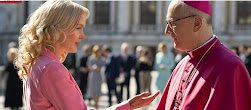 I became aware of urban legends after reading Jan Harold Brunvand's book The Vanishing Hitchhiker: American Urban Legends and Their Meanings. I was delighted to discover how folklore evolved to fit modern life while tapping into ancient human concerns about death, strangers, and the supernatural.
I became aware of urban legends after reading Jan Harold Brunvand's book The Vanishing Hitchhiker: American Urban Legends and Their Meanings. I was delighted to discover how folklore evolved to fit modern life while tapping into ancient human concerns about death, strangers, and the supernatural.
I hadn't thought about urban legends for years, but recent YouTube stories have emerged surrounding Pope Leo XIV. They constitute a fascinating sub-genre of urban legends.
The first involved the new pope's relationship with Pope Francis' dog (play the story). Pope Francis didn’t have a dog, of course, but the tale claims the newly elected Leo XIV refused to move into the papal apartments until the late pope’s "beloved Labrador" could be honored with a proper memorial. It’s sweet, moving and completely invented. It is also easy to see the association of Francis with animals and to imagine a beloved pet he would have loved is completely plausible.
Other stories like this has come to my attention (play the Levitt story). In it, Karolyn Leavitt, a young American politician, is said to have had a spontaneous audience with Pope Leo as part of a delegation or after an unplanned detour in Rome. The story claims the pope offered her words or actions of profound personal guidance that changed the course of her political life, whether by asking her to remove her cross necklace, not shaking her extended hand, instead hugging her, or involving her in an ancient, hand-washing ritual. There are many variations of the story, and also there’s no evidence any of them ever happened. All of them cast him as an upright figure, dramatically passing along wisdom, unity, or both.
I see multiple reasons for casting the new pope as a hero in stories like this. For one, urban legends often function as cultural mirror and moral compass. These stories reflect our longing for leaders who are humble, compassionate, and divinely wise, especially in an era when religious authority is frequently questioned.
Additionally, the Internet has become a fertile ground for this kind of modern mythmaking. Videos and memes spread quickly, often stripped of context, allowing these emotionally resonant tales to feel true even when they’re not. The Vatican’s perceived mystery and gravitas make it a perfect setting for such narratives. In the same way ghost stories haunt lonely roads, urban legends now linger in the digital hallways of faith and fame.
More importantly, these stories serve a social purpose. They provide comforting fictions in uncertain times. A pope who honors a fictional dog or gently redirects a young leader offers a vision of goodness many people yearn to believe in. And just like the vanishing hitchhiker, the story sticks not because it’s true, but because it feels true, either emotionally, morally, spiritually, or all three.
Whether told around a campfire or streamed through a TikTok feed, urban legends remain alive and well, shifting, evolving, and reflecting the values of the moment. Pope Leo XIV, real or not in these stories, is simply the latest character in a long tradition of mythical figures who carry our collective hopes, anxieties, and desires.




No comments:
Post a Comment